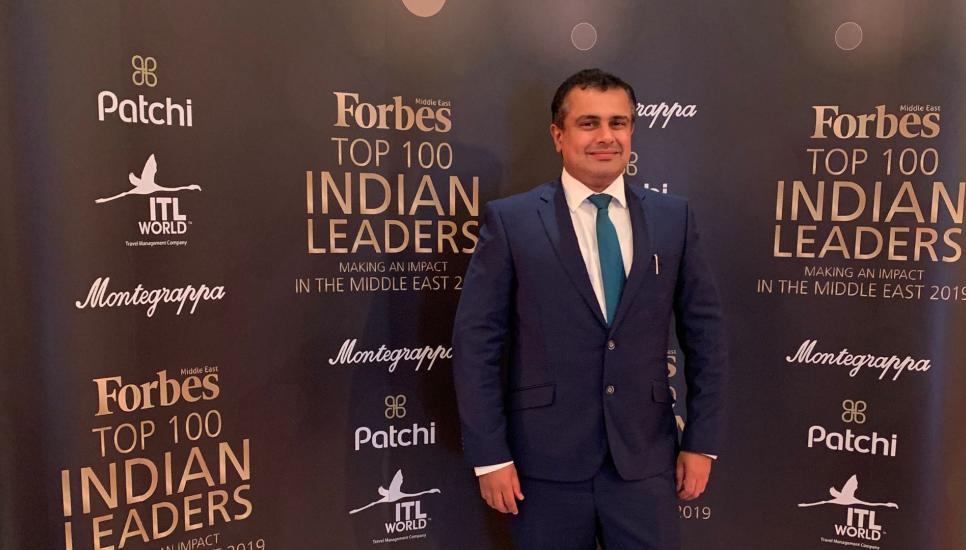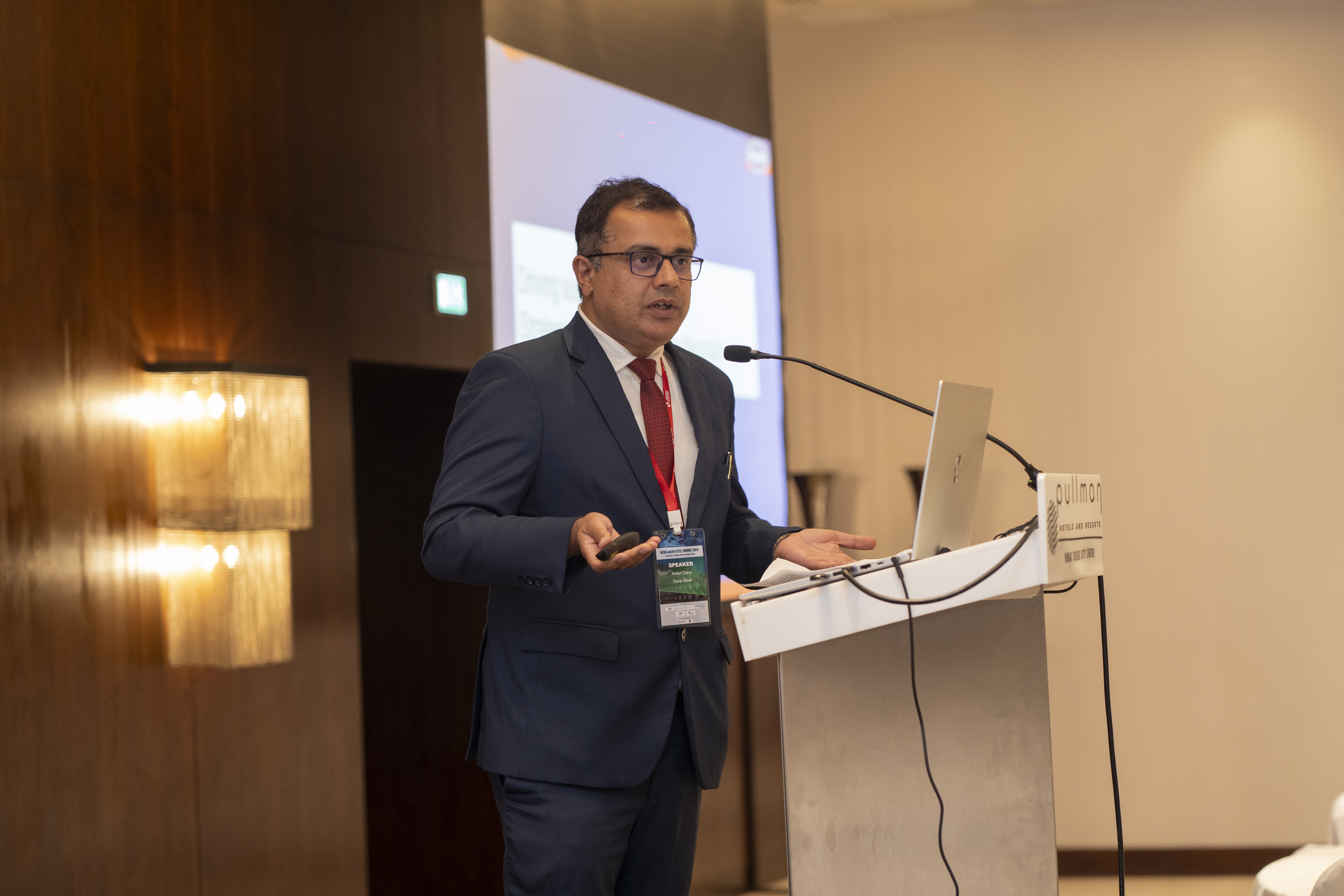Diversified towards green investments

A Next Gen leader, Ankur Dana is chief executive of the Dana Group of Companies and its key industrial divisions of steel, oil and petrochemicals. A doctor by training, he also managed the family office which is mostly focus on investments in healthcare. He talks to Campden FB about the challenges of being a Next Gen and his focus on sustainability.
Could you talk to me about how the Dana Group was founded?
Ankur Dana: We are a 100% family-owned business, and I am the second generation involved. My father is the founding member and currently serves as the chairman of the group. He began the business in 1991 with general trading operations here in Dubai. Over the years, we have steadily grown.
For the first decade, the focus was primarily on general trading. However, in 2001, we expanded into manufacturing, starting with a small factory in Dubai. Since then, our operations have evolved, and today, we operate nine factories across the UAE. While our first factory still stands, it is now the smallest compared to our expanded manufacturing capabilities.
Over the years, we’ve diversified into various sectors. In manufacturing, our major divisions include steel, oil, and HVAC. In addition to manufacturing, we also have significant interests in real estate, hospitality, and healthcare.
What are the challenges of being a NextGen? How do you balance your own interests and your own vision of where you think the company should be going with the original views of the company?
Ankur Dana: We come from a family of doctors. My father is a qualified physician who practiced as a general surgeon before venturing into business. Although I am also a medical doctor, I never pursued the medical profession in the traditional sense. We have a hospital back home in India, but my career path took a different direction.
My father shifted his focus to entrepreneurship when he started the business. As for me, I had just graduated from medical school when I was faced with a choice: to manage the hospital or join him in the manufacturing business. Naturally, he wanted me to support him in manufacturing, which had become his primary focus by then. I joined him in 2005, and it’s been nearly 20 years since.
The transition wasn’t without its challenges. As with many second-generation leaders, I had my own ideas and vision for the future of the business, which sometimes differed from my father’s traditional approach. But at the time, being fresh out of college, I mostly followed in his footsteps, learning the ropes of the business. For the first few years, I immersed myself in different areas – production, manufacturing, sales, and marketing – rotating through various departments, which gave me invaluable experience.
My father has a more traditional mindset when it comes to running a business, relying on personal relationships and face-to-face interactions. Today, however, the world is much more technology-driven, and we export to over 80 countries worldwide from Dubai. I’ve brought a more modern, tech-savvy approach, especially in leveraging social media and digital platforms to engage with global audiences.
In the end, I’d say we’ve found a balance of both his traditional methods and my more contemporary, technology-focused strategies that has brought the business to where it is today.
How did you manage those conversations?
Ankur Dana: Technology is an area where there was a bit of a learning curve, especially for my father’s generation. At 74, he isn’t as tech-savvy as I am, but he’s always been open-minded about it. Over time, he could clearly see the impact technology was having, particularly in sales and marketing.
For example, we’ve had clients from numerous countries visiting our factories, even though we hadn’t physically travelled to their regions. Through tools like email marketing and social media, we were able to reach out to them, and they came to us. That experience made a strong impression on my father, as it highlighted the power of technology in expanding our global reach.
While we had some initial differences, those have since been resolved, and technology has become an integral part of our company’s growth.

Do you plan to pass the family business on to a third generation?
Ankur Dana: I’m 42 now, and my children are still quite young. While it’s a bit early to involve them fully in the business, they have accompanied me on visits to our factories on occasion. For now, that’s the extent of their exposure to the business.
Looking ahead, I believe it’s important for my children to pursue whatever path they are most passionate about. I don’t intend to pressure them into joining the business unless that’s what they truly want. Personally, I envision a future where the company is not solely reliant on me or my family to run it. Instead, I’d like to see it evolve into a more people-run organisation, possibly even taking it public one day, with an IPO and allowing my current team to become shareholders.
What does sustainability mean for you?
Ankur Dana: As a group, we have three key divisions in the manufacturing sector: steel, oil, and HVAC [heating, ventilation, and air conditioning]. The truth is, all three of these industries are closely tied to sustainability, which has become a pressing issue, especially with events like COP28 and ongoing international environmental discussions. Steel, in particular, has been at the forefront of these conversations. Since steel is one of our major verticals, we recognise the importance of being leaders in sustainability, especially when it comes to producing “green steel”. The entire industry is moving in this direction.
Sustainability isn’t just a concept we talk about; it’s something we actively incorporate into our company culture. This can range from small, practical steps – like encouraging employees to reduce waste, reuse materials, or even something as simple as printing on both sides of a sheet of paper – to larger sustainability efforts. For us, being a manufacturing company means adhering to environmental audits, like the Environmental Product Declaration (EPD) certification. These cover everything from our shop floor practices to our offices, supply chains, logistics, and even the materials we use for imports and exports.
At the moment, we don’t operate the more carbon-intensive parts of steel production, like blast furnaces or electric arc furnaces, which are responsible for significant carbon emissions. Our focus is more downstream, where we manufacture value-added products. However, we still have a considerable energy consumption – one of our factories alone consumes around 10 megawatts of power.
To offset this, for example, we’ve installed 1.2 megawatts of solar power on the rooftops of our factories. This is quite significant; in fact, that amount of power could run up to ten smaller factories.
Beyond that, we focus on reusing and recycling a large portion of our metal scrap, without the need for energy-intensive melting processes. Smaller pieces of metal generated during production are repurposed into new items. We also have an in-house nitrogen generator, which produces nitrogen from air as part of our manufacturing process. This reduces the need for liquid nitrogen, which is typically transported in tankers, thereby reducing our carbon footprint.
How do you make sure that sustainability goes down through a company?
Ankur Dana: Our team is fully aligned with our sustainability goals. We regularly discuss these issues internally, and I often share my insights from the green steel conferences where I speak. Before attending these conferences, I make it a point to involve my team, seeking their input and ideas on how we can improve our sustainability practices.
One interesting suggestion that came up was the use of portable hydrogen electrolysers. We have a fleet of 29 trucks, and we decided to pilot these electrolysers, which we sourced online. It’s a small kit that can be attached to heavy trucks to generate free hydrogen, helping to reduce fuel consumption. It’s a small step, but initiatives like these are part of our broader effort to integrate sustainable practices into every aspect of our operations.
How do you balance your focus on the three industrial divisions that we just talked about with what a clear it clearly your personal interests of healthcare?
Ankur Dana: We still have a hospital in India. However, it’s currently managed by a professional team, and we aren’t involved in the day-to-day operations. For us, the hospital isn’t about maximising profits – it’s more about ensuring that it runs sustainably and continues to serve the community. Any revenue generated is reinvested into the hospital to improve its operations and infrastructure.
For instance, during the COVID-19 pandemic, when India was facing a severe shortage of medical oxygen, we installed an in-house oxygen generation plant at our hospital to address the crisis. Additionally, we’ve incorporated sustainability measures, like solar panels on the roof, to make the facility as eco-friendly as possible.
Community outreach is a key focus for us. Last year, we held at least eight blood donation camps, and we also run rural outreach programs to provide medical examinations to underserved populations in India’s rural areas.
What are the challenges that you see facing your family office? What keeps you awake at night?
Ankur Dana: At the moment, our investment portfolio is increasingly focused on green funds and environmentally conscious ventures. Given our involvement in the steel industry, we have a strong understanding of how global economies are likely to evolve in the coming years. This insight guides our investment strategy, particularly as we prepare for major shifts in regulation and sustainability.
One of the most significant developments is the European Union’s Carbon Border Adjustment Mechanism (CBAM), which will have a profound impact on how industries operate. Every organisation within the EU will be required to account for CBAM credits, and their supply chains will need to be thoroughly audited. This is a major concern moving forward, as it will reshape the entire ecosystem of international trade and industry.
The US is also catching up with initiatives like the Inflation Reduction Act (IRA), which includes sustainability measures that will affect how industries function. As a company in the steel business, we are keenly aware that these regulations will have a lasting impact. That’s why our portfolio is increasingly diversified towards green investments, ensuring we are well-positioned for the future.






